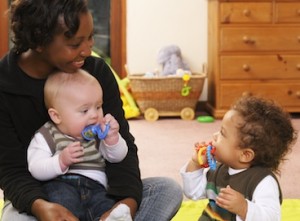
| Investigator |
| Lisa Berlin Brenda Jones Harden University of Maryland |
| Project Description |
| This 5-year Early Head Start-University Partnership is being conducted in collaboration with four Early Head Start programs in the greater Washington, DC area. The project involves implementing a supplemental parenting intervention for especially high-risk Early Head Start mother-infant dyads, Dozier’s Attachment and Biobehavioral Catch-up (ABC), and evaluating the effects on parenting behaviors and infant stress regulation. Participants are 270 mothers and their infants receiving home-based Early Head Start services. There are three broad objectives: (1) To define criteria for identifying Early Head Start families at risk for experiencing “toxic stress” and validate these criteria empirically: (2) To evaluate through a randomized trial the efficacy and value added of supplementing Early Head Start services with the ABC program; (3) To evaluate the implementation and sustainability of the ABC program within the Early Head Start context. Key outcome assessments include observed parenting behaviors, infant’s stress regulatory behaviors, and infant’s salivary cortisol production during a series of mildly stressful activities. This project is part of Administration for Children and Families Buffering Toxic Stress research consortium. |
| http://www.acf.hhs.gov/programs/opre/resource/early-head-start-university-partnership-grants-buffering-children-from |
